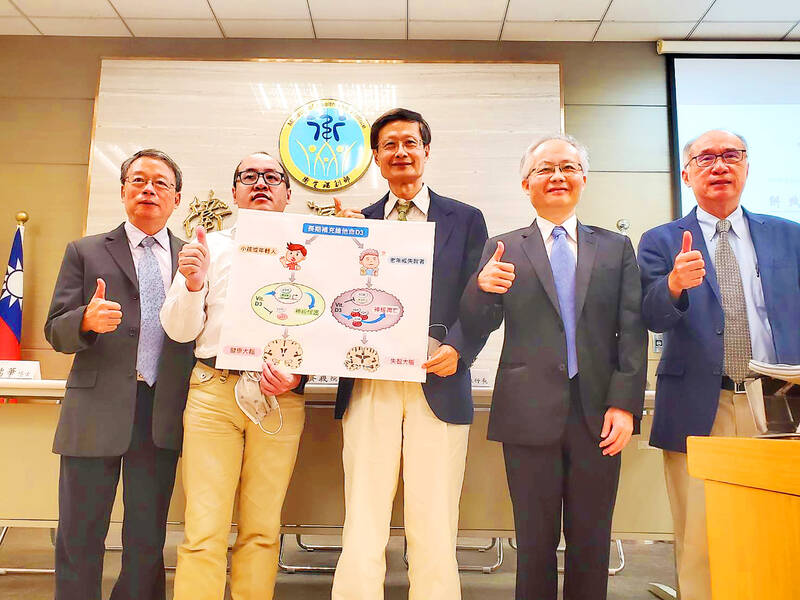Elderly people who take vitamin D supplements long-term and regularly have 1.8 times the risk of developing Alzheimer’s disease or other forms of dementia compared with those who do not, National Health Research Institutes (NHRI) scientists said yesterday.
The Ministry of Health and Welfare said that 7.78 percent of Taiwanese aged 65 or older have some form of dementia.
Vitamin D plays a role in maintaining cognitive function, and many studies have found that vitamin D deficiency correlates with an increased risk of dementia, leading many people to take the vitamin to prevent the disease, NHRI Institute of Molecular and Genomic Medicine researcher Juang Jyh-lyh (莊志立) said.

Photo: Lin Hui-chin, Taipei Times.
However, a study led by Juang and NHRI National Center for Geriatrics and Welfare Research scientist Hsu Chih-cheng (許志成), using the National Health Insurance database, found that elderly people who took a 0.25mg vitamin D3 supplement 146 days or more each year had 1.8 times the risk of developing dementia compared with those who did not take the supplement.
Additionally, people with dementia who took vitamin D3 had a 2.17 times greater risk of death, he said.
Juang said his research team conducted additional studies that experimented on mice, finding that mice with Alzheimer’s disease that were fed a vitamin D-sufficient diet showed significantly lower levels of serum vitamin D.
When vitamin D was decreased in the mice, the number of the vitamin’s binding receptors in the brain increased in the same plaques considered a trigger for Alzheimer’s disease, he said.
Overall, the study seems to show that vitamin D deficiency might be a result rather than a cause of Alzheimer’s disease, and that vitamin D supplements could hasten brain degeneration in people who have the condition.
However, Juang added that the findings do not suggest that vitamin D supplements have no benefit, as they could be valuable in other areas of health.
Juang said that he would remind people not to over-use vitamin D supplements.
Those who might be vulnerable to dementia should re-evaluate the need for the vitamin and consult a physician before taking the supplement, he said.

The High Prosecutors’ Office yesterday withdrew an appeal against the acquittal of a former bank manager 22 years after his death, marking Taiwan’s first instance of prosecutors rendering posthumous justice to a wrongfully convicted defendant. Chu Ching-en (諸慶恩) — formerly a manager at the Taipei branch of BNP Paribas — was in 1999 accused by Weng Mao-chung (翁茂鍾), then-president of Chia Her Industrial Co, of forging a request for a fixed deposit of US$10 million by I-Hwa Industrial Co, a subsidiary of Chia Her, which was used as collateral. Chu was ruled not guilty in the first trial, but was found guilty

DEADLOCK: As the commission is unable to forum a quorum to review license renewal applications, the channel operators are not at fault and can air past their license date The National Communications Commission (NCC) yesterday said that the Public Television Service (PTS) and 36 other television and radio broadcasters could continue airing, despite the commission’s inability to meet a quorum to review their license renewal applications. The licenses of PTS and the other channels are set to expire between this month and June. The National Communications Commission Organization Act (國家通訊傳播委員會組織法) stipulates that the commission must meet the mandated quorum of four to hold a valid meeting. The seven-member commission currently has only three commissioners. “We have informed the channel operators of the progress we have made in reviewing their license renewal applications, and

Taiwan People’s Party (TPP) Chairman Huang Kuo-chang (黃國昌) yesterday appealed to the authorities to release former Taipei mayor Ko Wen-je (柯文哲) from pretrial detention amid conflicting reports about his health. The TPP at a news conference on Thursday said that Ko should be released to a hospital for treatment, adding that he has blood in his urine and had spells of pain and nausea followed by vomiting over the past three months. Hsieh Yen-yau (謝炎堯), a retired professor of internal medicine and Ko’s former teacher, said that Ko’s symptoms aligned with gallstones, kidney inflammation and potentially dangerous heart conditions. Ko, charged with

Taiwan-based publisher Li Yanhe (李延賀) has been sentenced to three years in prison, fined 50,000 yuan (US$6,890) in personal assets and deprived political rights for one year for “inciting secession” in China, China's Taiwan Affairs Office spokesman Chen Binhua (陳斌華) said today. The Shanghai First Intermediate People’s Court announced the verdict on Feb. 17, Chen said. The trial was conducted lawfully, and in an open and fair manner, he said, adding that the verdict has since come into legal effect. The defendant reportedly admitted guilt and would appeal within the statutory appeal period, he said, adding that the defendant and his family have